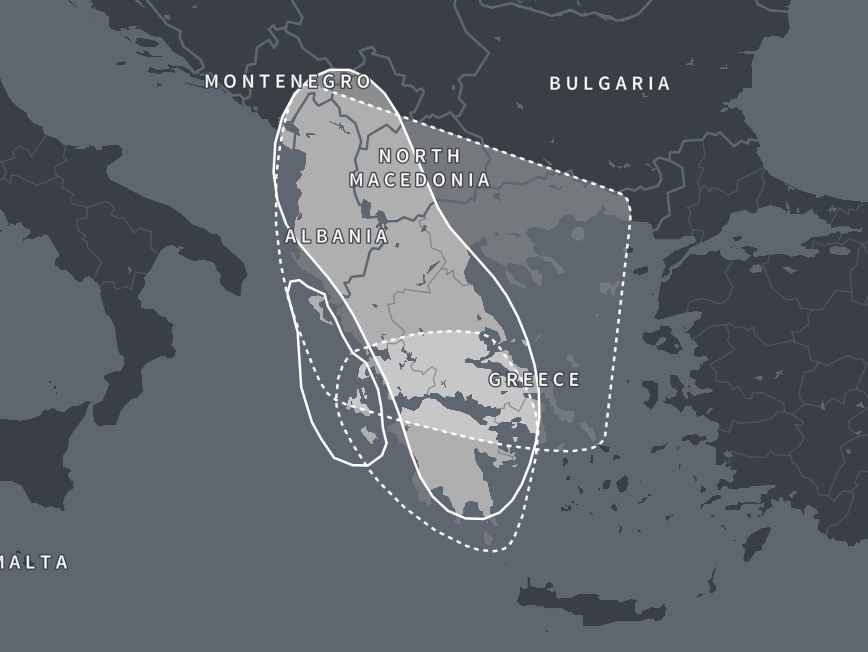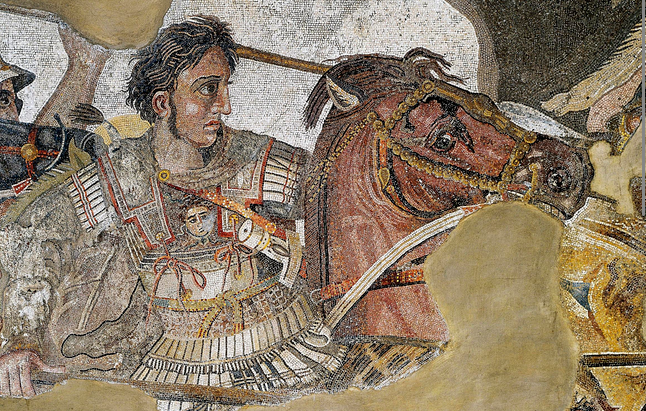What is Greece and Albania DNA Ethnicity on Ancestry?
The results of our AncestryDNA tests may sometimes be what we expect or on occasion may be a big surprise. Either way, often we need a little more information regarding some of the regions that arise in our ethnicity estimates.

One region that is not at all uncommon is the Greece & Albania DNA region. Those who still live in this region already understand all about its history and culture. There are others, however, who may never have even visited or in fact been aware that they have ancestors from that area.
In this post we will go into more detail with regards to the history, geography and culture of the Greece & Albania region. We will also discuss what it means to be from this region and how easy or difficult it might be to trace our roots in the Greece & Albania Region.
What Is the Greece & Albania DNA Region?
The Greece & Albania DNA region is a small but well explored area in the Mediterranean. As the name suggests the countries of Greece and Albania make up most of the region but there are some other countries which are also partially involved. These are:
- Montenegro
- Kosovo
- North Macedonia
- Bulgaria

Greece & Albania Sub-Regions
There are two main subregions of this DNA region which both have smaller communities that apply. This is helpful in finding a more precise region from which your DNA may have originated.
Albania, Northern Greece & North Macedonia
This subregion as a whole covers most of the Greece & Albania region but stops just north of Tripoli. In itself it has five different sub-regions which are:
- Albania & Western North Macedonia
- Northern Greece
- Southern Albania & Northern Greece
- West Central North Macedonia
- South Greece
The South Greece sub-region spans almost all of Greece, Albania, North Macedonia and southern Montenegro. In itself South Greece has seven sub-regions which are:
- Central Greece
- Ionian Islands
- Peloponnese
- South Peloponnese
- Southeast Peloponnese
- Southwest Peloponnese
- West Peloponnese
History of Greece
Greece Prehistory
The early humanoid remains found in Greece belonged to a species known as Homo Heidelbergensis and dated back to around 250,000 - 350,000 years ago. This region is also home to the oldest modern human remains found outside of Africa. Dating back 210,000 years.
Ideally placed between the rest of Europe and the near east Greece has always had a leg up when it came to the development of civilizations. It is in fact considered the birthplace of western civilization. The Cycladic Culture was the first in the region dating back to 3100 – 1000 BC. They developed in the Cyclades islands in the Aegean sea and only slightly out date the more famous Minions and other mainland civilizations.
Minoan Civilization
Although not the first civilization in the region, the Minoans ruled in Crete between 2,700 – 1500 BC. They along with the Mycenaean civilization (1600 – 1100 BC) were the first to develop a written language. The Minoans language is still yet to be deciphered by the Mycenaean language and is considered the forerunner of modern Greek.

In the century in which the Minoan and Mycenaean civilizations essentially coexisted the Minoan would gradually be absorbed into the newer culture. The Mycenaean however were short lived and around 1200 BC their civilization violently collapsed.
This collapse also decimated a number of the region's civilizations and ushered in the Dark Ages of which little is known due to a lack of record keeping.
End of the Dark Ages
The Dark Ages in Greece ended around 776 BC this would also coincide with the very first Olympic games. This was an era of enlightenment in Greece and saw the rise of the kingdoms of city states for which ancient Greece is so well known.
These states would expand, increasing the influence of Greece more widely in the region and would usher in a time of prosperity. With a huge boom in the region in 508 the world's first democratic system was developed.
The Persian Empire
Around 500 BC the northern regions of Greece were captured by the Persian Empire who resisted attempts to take back their conquests from the local city states of Asia Minor. Not only did the Persians hold what they took but they pushed further down into mainland Greece by 492 BC. They eventually came up against the Spartans and the Hellenic league who would push them back in 481 BC.
City States at War & Alexander
Greece was a very divided region in the years following the Persians and almost constant conflict was the norm in the region. It was under Alexander the Great however that some sense of unity was established and the foundation for what would become a vast empire was founded.

Using the combined forces of the League of Corinth Alexander waged war against the Persians in 334 BC. Alexander would remain undefeated in battle and would go on to dominate most of Asia.
Romans
After the death of Alexander his great empire was divided into kingdoms which gradually started to fall into disarray. The once great empire was gradually taken over by the Roman Empire until finally by 27 BC Rome had completely annexed the Greek region.
The Byzantine Empire
Rome held control of the region until the 5th century when the western part of its Empire fell. The status quo still existed in the east however although what remained was disconnected from Rome and we refer to this today as the Byzantine Empire. They would have referred to themselves however as the Kingdom of the Romans.
The Byzantines continued on until 1453 but were greatly depleted and forced back to the Greek islands by centuries of invaders including the Huns, the Goths and Slavic tribes. They did not tend to settle but greatly impacted the prosperity of the Region.
It wasn’t until the 8th century that the Byzantines started to recover their lost provinces and establish imperial control of the region once again. This would be the start of a rebirth of Greece and a time of prosperity.
This would last for a few centuries until in the 14th century much of the Greek Peninsula was lost to the Serbs and then later the Ottoman Empire. Ultimately by 1460 the Byzantine Empire had been crushed and the Ottomans controlled Greece.
How Did You Get Greece & Albania Region DNA?
If you already know that you had family who came from Greece & Albania or any of the bordering European states then you know why you have Greece & Albania region DNA. If this result came as a surprise you may not know how exactly you came by DNA from this region.

If you have a sizable percentage of DNA from this region then it is likely you have an ancestor who was born in or close to the country of Greece & Albania.
Is the Result Accurate?
When it comes to ethnicity estimates the higher the percentage you have from a certain region the more likely it is to be accurate. If your percentage is low, however, then it is harder to pinpoint exactly where your most recent ancestors came from.
A low result could mean you have a distant ancestor from that region. It is best to focus on your highest rated region's matches to determine where your ancestors came from more recently. A low percentage can often be hard to locate because the ancestor in question could be many generations back in your tree.
How to Research My Ancestry from These Regions
The results of a DNA ethnicity test are of course a great place to start especially if there is an unexpected result found in the report. As always of course the DNA cannot tell the whole story and we need to actually do the research work.
A percentage on an ethnicity estimate means very little unless you follow through and start building up your family tree. The relevant ancestors may be several generations back and it may take a lot of research to discover who they were.
If you have specific regions mentioned in your report then you have a good idea of where your ancestor may have originated from. Ancestry DNA even has migratory information from some of these regions through to the final settlement places in the United States or elsewhere in the world.
Using Ancestry you may be able to determine not only who your ancestors were from the British Isles but perhaps the reason they decided to move.
Greek Migration
Greek migration to the United States was very limited for a long time with just the occasional explorer finding his way to the new world although the first Greek person to officially be naturalized as a citizen was in 1725 and settled in Maryland.

Years later in 1768 a group of 500 from Smyna, Crete and Mani settled in New Smyrna Beach Florida. It was not a successful colony however so they moved to St. Augustine a few years later. Immigration would continue gradually over the years.
Final Thoughts
Greece may not be in the best shape financially these days but they have a rich history which saw the creation of some of the greatest concepts of modern times. From theatre to medicine and also politics the Greek peninsula has given the world a great deal.
Link To or Reference This Page
We spent a lot of time downloading, cleaning, merging, and formatting the data that is shown on the site.
If you found the data or information on this page useful in your research, please use the tool below to properly cite or reference Name Census as the source. We appreciate your support!
-
<a href="https://namecensus.com/blog/what-is-greece-and-albania-dna-ethnicity-on-ancestry/">What is Greece and Albania DNA Ethnicity on Ancestry?</a>
-
"What is Greece and Albania DNA Ethnicity on Ancestry?". NameCensus.com. Accessed on May 4, 2024. https://namecensus.com/blog/what-is-greece-and-albania-dna-ethnicity-on-ancestry/.
-
"What is Greece and Albania DNA Ethnicity on Ancestry?". NameCensus.com, https://namecensus.com/blog/what-is-greece-and-albania-dna-ethnicity-on-ancestry/. Accessed 4 May, 2024
-
What is Greece and Albania DNA Ethnicity on Ancestry?. NameCensus.com. Retrieved from https://namecensus.com/blog/what-is-greece-and-albania-dna-ethnicity-on-ancestry/.
